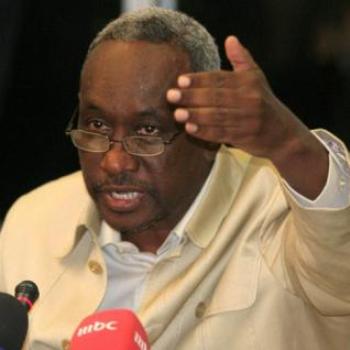Sudan’s vice president returns to Khartoum for consultations
 NAIROBI, March 7 (AFP) — The head of the Sudanese government delegation to peace talks in Kenya, Vice President Ali Osman Taha, returned to Khartoum on Sunday for consultations with other officials, the chief mediator said.
NAIROBI, March 7 (AFP) — The head of the Sudanese government delegation to peace talks in Kenya, Vice President Ali Osman Taha, returned to Khartoum on Sunday for consultations with other officials, the chief mediator said.
“Taha left today (Sunday) morning for consultations with the government in Khartoum. He will be back in two days time,” said the mediator, Lazaro Sumbeiywo, a retired Kenyan army general.
Taha is the leader of Khartoum’s delegation to peace talks with the rebel Sudan People’s Liberation Army (SPLA).
“Other delegates are still negotiating at committee level,” Sumbeiywo told AFP by telephone from the talks’ venue in Naivasha, 80 kilometres (50 miles) northwest of Nairobi.
The current round of peace talks between Khartoum and the SPLA started on February 17. The SPLA team to the talks, aimed at ending more than two decades of civil war, is headed by the rebel movement’s leader John Garang.
The latest round is focusing on the status of three disputed areas, namely Abyei, the Nuba Mountains area and Southern Blue Nile region, as well as the sharing of political and administrative power.
While those regions are not strictly part of southern Sudan, which is largely controlled by the SPLA, the movement claims to represent the people of the areas.
Sudan’s civil war erupted in 1983 between the south, where most observe traditional African religions and Christianity, and the Muslim, Arabised north. The conflict along with war-related famine and disease has claimed at least 1.5 million lives, mostly in the south.
Khartoum and the rebels have already signed an agreement on a 50-50 split of the country’s wealth, particularly oil revenues.
In 2002, Khartoum and the SPLA struck a breakthrough accord granting the south the right to self-determination after a six-year transition period, and last September both sides reached a deal on transitional security, under which the government would withdraw its troops from the south.
